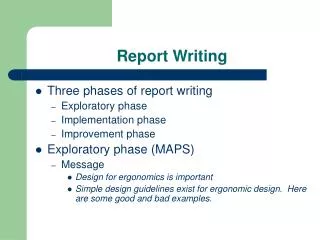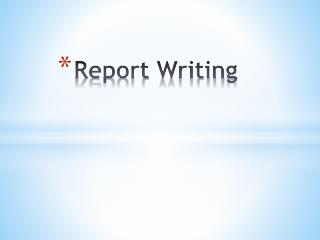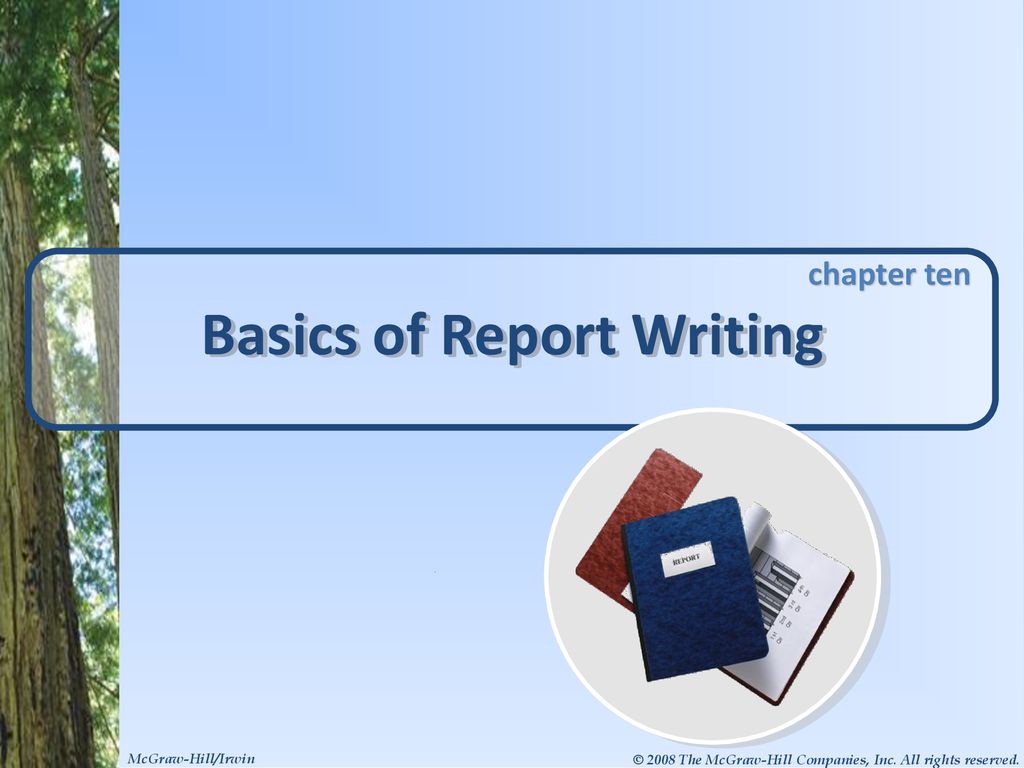

Report Writing
Aug 21, 2018
12.28k likes | 33.41k Views
The presentation highlights key points in preparing Report writing. It defines objectives , types, characteristics of reports .Moreover it shares examples of synopsis writing as well.
Share Presentation
- introduction
- child labour
- chapterization 1 2
- chapter conclusion draws conclusions

Presentation Transcript
Presented by Dr. Vijay . D. Songire Assistant Professor,SIES,Graduate School of Technology,Nerul,Navi Mumbai.
What is a Report • It is a systematic documentation of facts in order to come to a conclusion in an objective manner • It is a research document that helps the audience to understand certain issues in the respective field
Nature of the Report • Organized: The information is presented in a clearly structured format. Planning and proper presentation of data is required, making use of sections and headings make the report easier and convincing • Factual: facts should always be accurate and complete with clear meaning • objective: It is objective means uninfluenced by our personal feelings.
Objectives of Report writing • Solving any problem or any issue • Updating Information • Internal Communication • Effective tool for management • Planning and decision making • Eg. • Increasing Population in Metro Cities • Strategies to Improve sales
Stages in Report Writing • clarifying your terms of reference • planning your work • Writing an outline/Synopsis • collecting your information • organizing and structuring your information • writing the first draft • checking and re-drafting • Drawing Conclusions • Preparing Bibliography
Contents of Synopsis • Title page (1P) • Table of Contents/Index • Introduction (1P) • Objectives of the Study (1/2) • Chapterization (1/2) • Methodology • Findings • Bibliography
Language and Style in Report • This report was commissioned to review... This research indicates... The results suggest... It can be concluded that... Conclusions that can be drawn are... It recommends that... The following recommendations are made
Types of Reports Oral Written Written :1.Formal 2.Informal
Formal and Informal reports • Formal :It is prepared in a prescribed form and presented according to an established procedure to a prescribed authority. • Informal: It is usually in a form of person –to –person communication and may range from one single statement of facts on a single page ,to a more developed presentation of several pages.
Formal Reports • Routine : A report which happen in regular intervals eg. reports submitted annually,quarterly,monthly,fortnightly,weekly,daily. • Interpretative : these reports are also known as analytical or investigative reports.In this the major emphasis is on the analysis of the results of an investigation. • Informational: These reports mainly convey the information that is collected
Informal reports: Letter reports & Memorandum • Letter Report : • Date Inside Address • Sub: • Salutation • Main Body: . Introduction . Findings . Conclusion • Complimentary close • Signature • Enclosure
Memorandum • It is also called a memo which is used to send important information within an organization . Delhi Public School,Nerul • To: • From • Date: • Subject: • Introductory Paragraph,Reference,objective,main message ,Findings • Concluding Paragraph( Formal closing) • Signature
Eg. Introduction Child Labour Human history is the history of class struggle. Struggle between powerful and weaker sections of the society is visible throughout. While talking about the issue of child labour it becomes very important to understand the structure of society. In India Chaturvanya system encouraged the humiliation of dalits. Since present project studies humiliation and exploitation of the children it is very important to study the history behind it.
The first chapter Introduction gives detailed introduction of the project undertaken. It takes an overview of the background study of the topic taken for study. It specifies the objectives of the study as well. The second chapter Reasons behind child labour investigates the different reasons behind the issue of child labour. It does an in depth study of the problems exist in the society that are responsible for the practice of child labour.
The third chapter Effects of child labour point out various evil effects due to child labour. It throws light upon the social, economical, psychological and political effects of child labour.The forth chapter Solution discusses strategy to eradicate the evil of child labour. It gives recommendations to face this problem effectively to improve the status of the children who have already faced the dilemma of child labour.
The fifth and the last chapter Conclusion draws conclusions from the overall chapters.
Table of Contents Chapter 1. Introduction • Objectives of the Study • Background Study Chapter 2. Reasons behind Child Labour 2.1Social 2.2 Economical 2.3 Political Chapter 3. Effects of Child Labour 3.1 physical 3.2 Social 3.3 Psychological Chapter 4 Solutions Chapter 5 Conclusions
Continue… • Discussion-The facts and evidence you have gathered should be analyzed and discussed with specific reference to the problem or issue. If your discussion section is lengthy you might divide it into section headings. Your points should be grouped and arranged in an order that is logical and easy to follow. Use headings and subheadings to create a clear structure for your material. 1p e.g. Increasing Population in Metro Cities Introduction Causes Effects : i. Positive ii. Negative Conclusion
Continue… • Conclusion-1/2p • significance of what has been covered. • remind the reader of the most important points • highlight what you consider to be the most central issues or findings
Continue… • Appendices- • all the supporting information • This might include tables, graphs, questionnaires, surveys or transcripts.
Continue… • Bibliography- • Your bibliography should list, in alphabetical order by author . R. Subramanian. Professional Ethics. Oxford University Press: New Delhi,2013.
Eg..Strategies to Improve Managerial Skills • . Chapter 1 Introduction 1p Objectives Scope and Development • Chapter 2 Managerial skills3p • 2.1 Interpersonal Skills • 2.2 Body Language • 2.3 Relationship Management • Chapter 3 Strategies Improve Managerial Skills 3p • 3.1 Motivation • 3.2 Team Building • 3.3 Work Ethics • 3.4 Stress Management • Chapter 4 Conclusion • 1/2P
- More by User

Report Writing. Three phases of report writing Exploratory phase Implementation phase Improvement phase Exploratory phase (MAPS) Message Design for ergonomics is important Simple design guidelines exist for ergonomic design. Here are some good and bad examples. Report Writing.
1.62k views • 13 slides

Report Writing. Creating and Using a Mind Map. Creating a Mind Map. Decide on your subject. Language. Add sub-headings. writing. reading. Language. talking. listening. Add details. functional. fiction. writing. reading. creative. Language. non-fiction. talking. listening.
1.19k views • 11 slides

Report Writing . EMS and Fire Reports. Why do we write reports?. Medical documentation Administrative information Research Legal Attorneys will have access to YOUR report in a legal preceding. Patient Care Reports.
2.02k views • 24 slides

Report Writing. Structure to be jointly decided by designated consumer and accredited energy auditor as per guidelines of BEE. Importance of report is to highlight 1)Details of energy consumption and its costs 2) Specific Energy consumption
1.42k views • 18 slides

Report Writing. Types of Reports How to Write Reports Computer Reports Anatomy of a Report Sales Proposals Future of Reports. Agenda. CVs, Resumes Email, Web site, FAQs Letters, Newsletters, Brochures, Articles, Catalogs Advertisements, Notice Board, Pamphlets, Signs, Press Release
503 views • 0 slides

Report Writing. Combing everything we learned . SPELL CHECKER . Eye halve a spelling chequer It came with my pea sea It plainly marques four my revue Miss steaks eye kin knot sea.
457 views • 14 slides

Report writing
Report writing . Writing a research report By Keith Barker-Jones. Overview. Leading up to writing a dissertation a student is expected to: Prepare a project proposal Carry out a pilot study This verifies the feasibility of the methodology. Project proposal.
854 views • 25 slides

Report Writing. Four Models for Reports Test Oriented, Client Oriented, Domain Oriented, Hypothesis Oriented. Report Writing. Test-Oriented -results discussed test by test basis. Each test is listed by name and the significant results for the test are presented.
379 views • 4 slides

Report Writing. QUALITY CONTROL INSPECTOR. WEATHERIZATION ASSISTANCE PROGRAM STANDARDIZED CURRICULUM – September 2012. Learning Objectives. REPORT WRITING. By attending this session, participants will be able to: Discuss the purpose of various reports.
536 views • 16 slides

Report Writing. Report Writing. Lesson Objectives In these lessons you will learn: what a report is the aim of writing a report how to set out a report standard formats for reports how to write and present your own report. Report Writing.
762 views • 12 slides

Report Writing. Personal Information. Name: Darrell Simons Parents: Bob and Judith Simons Occupations: Father, Engineer Mother, Pediatrician Siblings: only child Birth date: May 5, 19-- Grade: 7th Age: 14 School: Midvale Middle School
621 views • 8 slides

Report Writing. Sana Anwar & Joe Baril. What is Report Writing?. An answer or account of something, usually as a result of research and learning (one would hope).
476 views • 13 slides

Report Writing. [email protected] Based on material from G52GRP. Layout of Slides. General tips on writing reports. Principles, practices and guidelines for technical writers. Report Structure - Front Page. Your reports should have a front page containing the following:
2.11k views • 27 slides

Report Writing. Contents. Executive Summary – TO BE DEVELOPED Chapter 1 Background and History of the RMATS effort Chapter 2 RMATS Process Chapter 3 Modeling Effort Chapter 4 Wind Power: Tariff and Operational Issues
506 views • 11 slides

Report Writing. Report Writing. Report Writing----Involves a Process which Produces a Written Document Raises Questions: How To Write? No Fixed Answer: General Suggestions. Theory VS Practice. Theory VS Practice---General Debate Both Are Inter-Related
593 views • 22 slides

Report Writing. A report should be self-explanatory. It should be capable of being read and understood without reference to the original project description. Thus, for each question, it should contain all of the following:. a statement of the problem;
683 views • 22 slides

Report Writing. By Prof. Asad Yaqub. What is a report writing?. A report is a very formal document that is written for a variety of purposes in the sciences, social sciences, engineering and business disciplines. Different types of reports.
1.41k views • 26 slides

Report Writing. Andy Dawson Department of Information Studies, UCL. What’s in this session. Some basic thoughts about communication What do we mean by a “report”? What makes a good one? How might we go about writing one? What academics particularly look for Research methodology
870 views • 29 slides


REPORT WRITING
REPORT WRITING. Many types but two main kinds: analytical e.g. recommendations to hospital administration on an issue practical e.g. lab experiment. Report Writing Style. Formal style (avoid using slang, colloquialisms and contractions) Have headings and subheadings Have paragraphs
720 views • 12 slides

Report Writing. Report writing. Before writing a report, the writer should ask What is the purpose of the report? What action is it intended to trigger? Who will read the report? How many people will read it? What do they need to know? What is their current level of knowledge?.
1.05k views • 31 slides

Report Writing. JoAnn Syverson Carlson School of Management University of Minnesota. Report Components. Title Page Name of report (all caps) Name, title, organization of receiver Author’s name, title, organization Date submitted. Report Components. Table of Contents
993 views • 15 slides

Report Writing. Charles L. Feer Bakersfield College. Overview. As a peace officer, or other criminal justice professional, you will frequently communicate in writing: What you saw. What you did.
597 views • 9 slides

- My presentations
Auth with social network:
Download presentation
We think you have liked this presentation. If you wish to download it, please recommend it to your friends in any social system. Share buttons are a little bit lower. Thank you!
Presentation is loading. Please wait.
Basics of Report Writing
Published by Pamela Higgins Modified over 6 years ago
Similar presentations
Presentation on theme: "Basics of Report Writing"— Presentation transcript:

The Systems Analysis Toolkit

Copyright © 2003 by The McGraw-Hill Companies, Inc. All rights reserved. Business and Administrative Communication SIXTH EDITION.

EE 399 Lecture 2 (a) Guidelines To Good Writing. Contents Basic Steps Toward Good Writing. Developing an Outline: Outline Benefits. Initial Development.

Business Reports Types Preparation Organization presentation.

CANKAYA UNIVERSITY FOREIGN LANGUAGES UNIT

What it is and what it is used for?. It is a type of writing by an author who is trying to get something. As a result, it is an extremely persuasive.

Report Writing A report is an orderly and objective communication of factual information that serves some business purpose 1.

Lecture Seven Chapter Six

Writing a Persuasive Essay

Organizing ideas and writing the outline

chapter 8-1 “Reports often lead to the most important business decisions.” eight Researching + Writing Reports.

One way to inspire or inform others is with a multimedia presentation, which combines sounds, visuals, and text.

REPORT WRITING WHAT IS A REPORT? A report is a very formal document that is written for a variety of purposes in the sciences, social sciences, engineering.

© 2014 by McGraw-Hill Education. This is proprietary material solely for authorized instructor use. Not authorized for sale or distribution in any manner.

16-1 Chapter 16 Analyzing Information & Writing Reports Analyzing Data Choosing Information Organizing Reports Seven Organization Patterns.

Preparing Informative and Influential Business Reports

McGraw-Hill/Irwin © 2005 The McGraw-Hill Companies, Inc. All rights reserved. Basics of Report Writing CHAPTER TEN.

McGraw-Hill/Irwin Copyright © 2012 by The McGraw-Hill Companies, Inc. All rights reserved.

Report Writing Lecturer: Mrs Shadha Abbas جامعة كربلاء كلية العلوم الطبية التطبيقية قسم الصحة البيئية University of Kerbala College of Applied Medical.
About project
© 2024 SlidePlayer.com Inc. All rights reserved.

IMAGES
COMMENTS
Presentation report writing skills.... The document discusses the key topics of a workshop on report writing including the objectives, importance, types, functions, uses, advantages and qualities of well-written reports.
The document provides guidance on writing a report. It begins by defining a report and listing the objectives of report writing. It then discusses the various types of reports, the steps involved in writing a report, and the significance and layout of reports.
This document provides information about report writing from a presentation given by Prachi Ashvin Patel. It defines a report as a major form of business, professional, or technical communication used to record information for a specific audience or purpose.
Objectives of Report writing • Solving any problem or any issue • Updating Information • Internal Communication • Effective tool for management • Planning and decision making • Eg. • Increasing Population in Metro Cities • Strategies to Improve sales
This workshop will: Provide a practical guide on how reports differ from other types of academic writing Look at the most common features used for this type of writing Give some insights into stylistic conventions used in report-writing, whilst highlighting the need for a subject-specific approach.
Overview Define report writing. Identify and state the problem. Determine the factors. Gather information. Interpret the data. Organize the findings. Create topic and talking headings. Write the report. Collaborate effectively This overview slide shows the topics to be covered in this chapter.